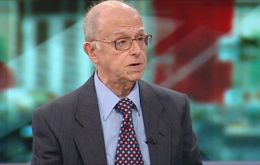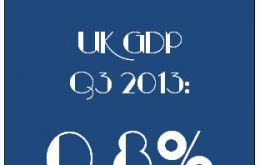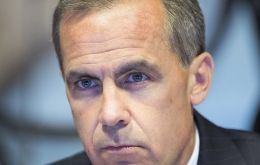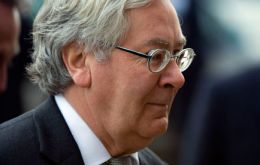MercoPress. South Atlantic News Agency
Tag: Bank of England
-
Wednesday, November 20th 2013 - 20:43 UTC
Bank of England enthusiastic about UK recovery, according to November minutes

The UK is in a sustained recovery and does not face major inflation risks, Bank of England policymakers have said. Minutes from the Monetary Policy Committee's November meeting showed the nine members all voted to leave interest rates at 0.5%.
-
Saturday, November 9th 2013 - 18:27 UTC
Bank of England leaves rates unchanged; focus on next week's inflation report

Bank of England has left interest rates unchanged at 0.5% and made no change to its program of quantitative easing, as had been widely expected. The decision came as no surprise as the Bank has said it will not consider a rate rise until the unemployment rate falls below 7%.
-
Friday, September 6th 2013 - 00:43 UTC
Bank of England leaves key rate and bond-buying program unchanged

Bank of England officials left their bond-buying program unchanged on Thursday as they assessed the impact of Governor Mark Carney’s forward guidance policy to keep interest rates low amid a strengthening economic recovery.
-
Thursday, August 8th 2013 - 03:15 UTC
Bank of England ‘forward guidance’: no rate rise until unemployment falls to 7%

The Bank of England's new Governor Mark Carney said the central bank will not consider raising its record low interest rate and stimuli until unemployment falls below 7%.
-
Friday, August 2nd 2013 - 02:47 UTC
Bank of England leaves rates unchanged as UK economy seems to be picking up

Bank of England's Monetary Policy Committee (MPC) has left interest rates at 0.5%. The key borrowing rate has been at that level since March 2009. MPC also said it would make no change to the £375bn of monetary stimulus it is providing through its quantitative easing program (QE).
-
Thursday, June 6th 2013 - 23:26 UTC
Bank of England leaves rate unchanged as it prepares to receive Mark Carney

The Bank of England on Thursday voted to keep its main interest rate at 0.5% following a monetary policy meeting, the last for departing Governor Mervyn King. The BoE also decided against creating more cash under its Quantitative Easing (QE) program that is aimed at boosting growth amid Britain's fragile economic recovery.
-
Friday, May 3rd 2013 - 02:27 UTC
Bank of Canada names long term bureaucrat and economist as new head

The Bank of Canada has named long-term bureaucrat and economist Stephen Poloz as its new head, replacing Mark Carney who is going to run the Bank of England. Mr Poloz was a surprise choice as many observers expected Mr Carney's senior deputy, Tiff Macklem, to succeed him.
-
Tuesday, March 5th 2013 - 16:52 UTC
Libor rate-rigging: UK regulator failed to act on warnings of “low-balling”

The UK Financial Services Authority repeatedly failed to act on warnings that banks were trying to rig inter-bank lending rates (mainly Libor) at height of the financial crisis, according to an internal review published Tuesday by the regulator.
-
Thursday, February 7th 2013 - 19:32 UTC
Bank of England next governor favours “flexible inflation targeting”

Bank of England has chosen not to inject any more money into the economy, leaving its quantitative easing (QE) programme at £375bn. The Bank also left interest rates unchanged at 0.5%.
-
Saturday, January 12th 2013 - 12:13 UTC
More signs that the UK economy contracted in the last quarter of 2012

Disappointing figures on industrial production and construction in November have added to fears that the UK economy contracted in the last quarter of 2012. The index of production grew 0.3% in November, compared with October, but had been expected to grow more as some North Sea oil and gas production resumed following maintenance.
